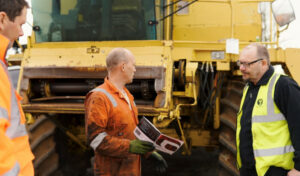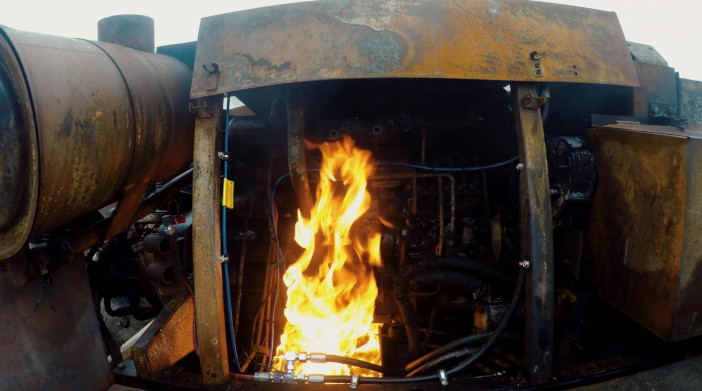Farmers installing fire suppression kits on their combines are set to benefit from discounted insurance premiums and a safer harvest, says NFU Mutual.
The rural insurer is offering incentives for combines fitted at the point of purchase or retrofitted with suppression systems that meet P-mark certificate standards. P-mark is a global standard which brings together best practice from Europe. It confirms that the product is type-tested and that installation and fitting is inspected.
“Combine fires put lives at risk, cause huge disruption to harvesting and destroy expensive machines so we’re very pleased to introduce insurance discounts on combines fitted with accredited suppression systems”, said Tom Murray from the agricultural vehicle underwriting team at NFU Mutual. “Sometimes engine bay fires can break out despite regular maintenance and removal of debris, but suppression systems mitigate risks and significantly reduce the severity and frequency of farm fires.”

In a recent live demonstration, the insurer partnered with Fireward, one of the leading manufacturers of suppression systems, and agricultural salvage firm Adam Hewitt Ltd to set fire to a combine and put a P-mark system to the test.
Mr Murray explained: “Tests have shown that fires can be reduced or prevented altogether by suppression systems. When an engine bay catches fire, it needs to be rapidly detected, effectively contained, and quickly extinguished. Suppression systems are also effective on fires involving solid combustibles, flammable liquids and electricity.”
P-mark approved kits involve dual agent systems which have two cylinders, one with powder and another with foam. The powder disrupts the chemical reaction taking place and cuts off the oxygen supply. The foam rapidly cools surfaces of over 200 degrees Celcius in larger engine bays, which will also hold turbochargers and filters.
A significant issue
In 2020, NFU Mutual dealt with more than eighty combine harvester fires, including eight where the machine in question was valued at over £100,000. In the same year, agricultural fire claims totalled £20 million.
Bob Henderson, who heads NFU Mutual’s engineering team, said: “Wider adoption of fire suppression systems could be a serious game-changer for arable farming – helping protect lives, property and the year’s harvest.
“While insurance can cover the cost of a replacement, farmers still risk losing critical harvesting time during a tight weather window and huge difficulty hiring a combine when machines are in high demand.”

Top tips to prevent harvest-time fires
NFU Mutual has also published advice to prevent fires this harvest, both in the field and in the yard.
- Regularly clean out dust and chaff from hot spots in combines and balers, and check the machine over after use.
- Fit a suppression system that meets P-mark status
- Use a mobile compressor to regularly blow away debris
- Switch off engines and ensure all moving parts have stopped before clearing blockages or carrying out maintenance
- Always stop operation to investigate hot-running engines or bearings
- Have a plan in place in the event of a fire, including a system to keep in contact with lone workers.
- Keep a mobile phone on you at all times. Do not leave it in the cab.
- Make sure drivers are aware of the locations and heights of power lines and check that machines will safely pass beneath them.
- Make sure there is a fire extinguisher on the combine and that it is regularly maintained. Also, ensure that you know where the nearest water source is.
For operations in the yard, it is advised that you:
- Instruct drivers to keep to safe speeds in the grain yard.
- Check signs are in place to help lorry drivers go to the right place, and alert members of the public to any potential hazards.
- Keep children away from working areas.
- Clean dust regularly from grain dryers and ensure that all staff running the drier are fully trained and know the correct procedures if a fire breaks out.
- Ensure fire extinguishers are readily available.
- Make sure ladders and platforms used for maintenance are in good condition and a safe system of work is in operation.
For more information speak to your local NFU Mutual agency or visit www.nfumutual.co.uk

